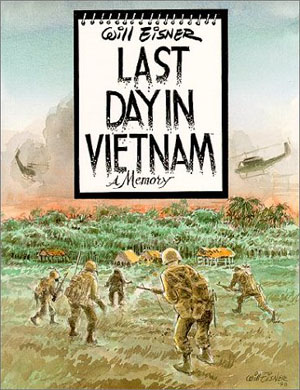Last Day in Vietnam: A Memory Review
By Zak Edwards
May 8, 2013 - 22:32
Dark Horse Comics
Writer(s): Will Eisner
Penciller(s): Will Eisner
Inker(s): Will Eisner
Letterer(s): Will Eisner
Cover Artist(s): Will Eisner
ISBN: 978-1-61655-120-9
$17.99, 80 pages
Release Date: March 06, 2013
 |
So, for the first, titular story, Eisner actually puts us into the eyes of a reporter, one who very closely resembles Eisner’s own history with the Vietnam War. The man assigned to this reporter is obviously lucky, a soldier who hasn’t had to really engage with the war effort. He is in the middle yet stands separate, in part because he comes from a family of soldiers that has afforded him certain privileges, but also because this advantage has insulated him from the experience. The story's perspective absorbs the reader entirely, juxtaposing the character’s lack of immersion into the war with the reader’s complete immersion. The first-person effect actually takes away your agency, in a certain capacity, you are addressed and you have your thoughts repeated back to you. You don’t really have any control and it’s pretty obvious that your escort through the war has no clue anyways. Three men are picked up in your helicopter at one point and, despite your guide trying to get them to smile, they don’t even talk. Only their dog makes a noise, and it is aggressive. The war has left these men in a silent anger, their dog’s emotions articulating what they no longer can. No wonder they came back with track marks, no wonder the rate of officers ‘accidentally’ killed in combat was so high. It’s strange that such an immersive story can lay bare so much of the anxieties of that period, but this is Will Eisner we are reading. The man himself. So experimentation and incredible storytelling is just a give in.
The other stories in this collection are significantly shorter, individual character pieces that formally experiment with how to tell stories. In one, “The Casualty,” a soldier permanently marred by war, wrapped in bandages that barely hide his destroyed hand, for example, remembers how he got his wounds. Encapsulating much of the sexuality of soldiers in wartime that is a major aspect of how the War is depicted, the protagonist thinks back to sleeping with a Vietnamese woman who then threw a grenade under his bed. The story is entirely silent and every moment is a wordless thought bubble of his experience juxtaposed with his retreat into alcohol and cigarettes. The story’s end, with him flirting with a different girl, speaks less to his own poor choices and more to his inability to properly articulate his experience. He can only remember without words, how is he to express this to anyone else? So, with the alcohol, cigarettes, and sex, he finds what he cannot speak.
Another story, of a man doing “hard duty” as a “wrench monkey” ends with him as the only soldier who regularly visits an orphanage for local girls impregnated by American soldiers. The underlying politics of sexual experience overseas is juxtaposed with the hard masculinity and the violence of the soldier. But here, a moment of complicated solace. The War brought tragedy, orphaned children, but individuals can make a difference. Eisner’s willingness to find these moments in amongst the murky politics of a war that ravaged the American psyche shows a balanced approach that, in the hands of less capable storytellers, would become preachy, soapbox-ish, and one of a million meditations on the subject. Here, Eisner’s approach offers moments that speak for themselves, speak to the tragedy and the politics in ways that take much of the political commentary for granted. Both a condemnation and a meditation on the shifting perceptions of war itself, Will Eisner’s Last Day in Vietnam tells seemingly simple stories that cannot ever be as basic as they pretend to be. They instead underline and bring to the surface many of the problems, the stereotypes, and regret of the period, only to leave the reader with a more humanist approach. Overall, the book's intense focus on individual characters serves as a broader analysis of the effects of the Vietnam War even in contemporary society, moving the war experience outside of rigid time and into our daily experience.
Related Articles:
Will Eisner's A Contract with God comics review
VIZ Media Announces Its 2015 Eisner Award Nominations
Action Lab's Relaunch of Eisner Nominated Series: PrinceLess
20th Century Boys Wins 2013 Will Eisner Award
2013 Eisner Award Nominations Announced
Dark Horse Celebrates New Edition of Will Eisner’s Last Day in Vietnam
VIZ Media Celebrates 2012 Eisner Award Nominations
20th Century Boys Wins Eisner Award
2011 Eisner Awards
Eisner Award Hall Of Famer Neal Adams To Attend Wizard World Big Apple Comic Con, May 21-22
